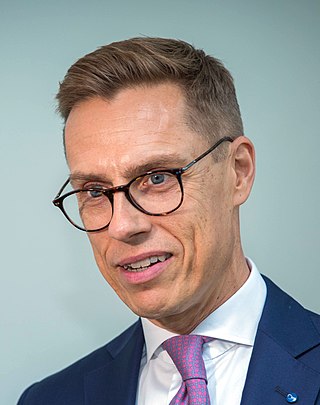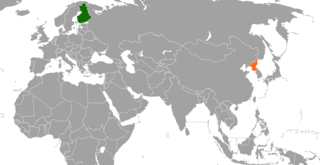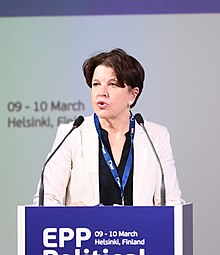
The foreign relations of Finland are the responsibility of the president of Finland, who leads foreign policy in cooperation with the government. Implicitly the government is responsible for internal policy and decision making in the European Union. Within the government, preparative discussions are conducted in the government committee of foreign and security policy, which includes the Prime Minister and at least the Minister of Foreign Affairs and the Minister of Defence, and at most four other ministers as necessary. The committee meets with the President as necessary. Laws concerning foreign relations are discussed in the parliamentary committee of foreign relations. The Ministry of Foreign Affairs implements the foreign policy.

Helsinki is the capital, largest and most populous city in Finland. Located on the shore of the Gulf of Finland, it is the seat of the Uusimaa region in southern Finland and has a population of 673,011. The city's urban area has a population of 1,268,296, making it by far the most populous urban area in Finland and the country's most important centre for politics, education, finance, culture and research. Helsinki is located 80 kilometres (50 mi) north of Tallinn, Estonia, 400 km (250 mi) east of Stockholm, Sweden, and 300 km (190 mi) west of Saint Petersburg, Russia. It has close historical links with these three cities.
The Green League, shortened to the Greens, is a green political party in Finland.
Helsingin Sanomat, abbreviated HS and colloquially known as Hesari, is the largest subscription newspaper in Finland and the Nordic countries, owned by Sanoma. Except after certain holidays, it is published daily. Its name derives from that of the Finnish capital, Helsinki, where it is published. It is considered a newspaper of record for Finland.

The University of Helsinki is a public university in Helsinki, Finland. The university was founded in Turku in 1640 as the Royal Academy of Åbo under the Swedish Empire, and moved to Helsinki in 1828 under the sponsorship of Tsar Alexander I. The University of Helsinki is the oldest and largest university in Finland with the widest range of disciplines available. In 2020, around 31,600 students were enrolled in the degree programs of the university spread across 11 faculties and 11 research institutes.

Matti Taneli Vanhanen is a Finnish politician who served as Prime Minister of Finland from 2003 to 2010. He was also Chairman of the Centre Party in 2006. In his earlier career, he was a journalist. Vanhanen is the son of professor Tatu Vanhanen and Anni Tiihonen.

The Finnish Security and Intelligence Service, formerly the Finnish Security Police and Finnish Security Intelligence Service, is the security and intelligence agency of Finland in charge of national security, such as counter-intelligence and counter-terrorism, under the jurisdiction of the Ministry of the Interior. The agency had a distinct role during the Cold War in monitoring communists as well as in the balance between Finnish independence and Soviet appeasement. After the 1990s, Supo has focused more on countering terrorism and in the 2010s, on preventing hybrid operations.

Jorma Jaakko Ollila is a Finnish businessman who was chairman of Royal Dutch Shell from 1 June 2006 to May 2015, and at Nokia Corporation chairman from 1999 to 2012 and CEO from 1992 to 2006. He has been a director of Otava Books and Magazines Group Ltd. since 1996 and UPM-Kymmene since 1997, and an advisory partner at Perella Weinberg Partners, a New York–based boutique investment bank founded by Joseph R. Perella and Peter Weinberg in 2006.

Cai-Göran Alexander Stubb is a Finnish politician who served as Prime Minister of Finland from 2014 to 2015. He rose to politics as a researcher specialized in the affairs of the European Union and was elected to the European Parliament in 2004 as a member of the National Coalition Party. In 2008, Stubb was appointed as Minister for Foreign Affairs following a scandal surrounding his predecessor, Ilkka Kanerva. In 2011 Stubb stood for election to the Finnish Parliament for the first time and was elected MP with the second highest vote count in the election, which led to Stubb becoming the Minister for Europe and Foreign Trade in Jyrki Katainen's cabinet.

Paavo Matti Väyrynen is a Finnish politician who, in his long and eventful political career, has served, among other things, as Minister of Foreign Affairs from 1977 to 1982, and again from 1983 to 1987 and from 1991 to 1993. He is a former member of the Finnish Parliament who has represented the Seven Star Movement, the Citizen's Party and Centre Party. He is currently member of Centre Party.

Sakari Severi Tuomioja was a Finnish politician and diplomat who served as Prime Minister of Finland between 1953–1954 and as Minister for Foreign Affairs between 1951–1952 and as the Governor of the Bank of Finland between 1945–1955. He was also Finland's ambassador in London and Stockholm.

The Finnish Defence Intelligence Agency is the combined signals (SIGINT), geospatial (GEOINT) and imagery intelligence (IMINT) agency of the Finnish Defence Forces. Operational since 2014, its responsibility is to support the defence of Finland through information gathering and analysis as an intelligence agency, organic to the Intelligence Division of Defence Command.

Ilkka Armas Mikael Kanerva was a Finnish politician and a member of the Parliament of Finland. He was born in Lokalahti, now a part of Uusikaupunki in Southwest Finland. He was the Minister for Foreign Affairs from 2007 to 2008. Kanerva was a member of the National Coalition Party.

The Finnish Institute of International Affairs is an independent research institute that produces topical information and research on international relations and the European Union. It also publishes the journal Ulkopolitiikka. It is located in Helsinki.

Parliamentary elections were held in Finland on 17 April 2011 after the termination of the previous parliamentary term. Advance voting, which included voting by Finnish expatriates, was held between 6 and 12 April with a turnout of 31.2%.

Juha Sihvola was a Finnish philosopher and historian. He was a university professor of general history from 2000, and part of The Academy of Finland's Centre of Excellence program upon Philosophical Psychology, Morality and Politics, serving as the Deputy Director of the Centre of Excellence from 2008. In the years 2004–2009, he was the Director of Helsinki Collegium for Advanced Studies.

Presidential elections were held in Finland on 28 January 2018. The incumbent Sauli Niinistö received 62.7% of the vote and was elected for a second term, avoiding a second round. The term is from 1 March 2018 to 1 February 2024 (if 2024 presidential election doesn't go to a second ballot) or 1 March 2024. Although the President is elected by direct election, Niinistö gained a plurality in all municipalities and a majority in all but 13 municipalities.

Elina Maria Valtonen is a Finnish politician who has served as Minister for Foreign Affairs under Prime Minister Petteri Orpo since 2023. A member of the National Coalition Party (NCP), she has represented the constituency of Uusimaa in the Parliament of Finland since 2014. In the 2021 muicipal election she collected the second-highest number of votes in Helsinki and was elected a member of its city council.

Finland–North Korea relations are bilateral relations between Finland and North Korea.

The European Centre of Excellence for Countering Hybrid Threats is a network-based international and independent hub for practitioners and experts based in Helsinki, Finland. The Hybrid CoE focuses on responses to hybrid threats under the auspices of the European Union (EU) and NATO.


















